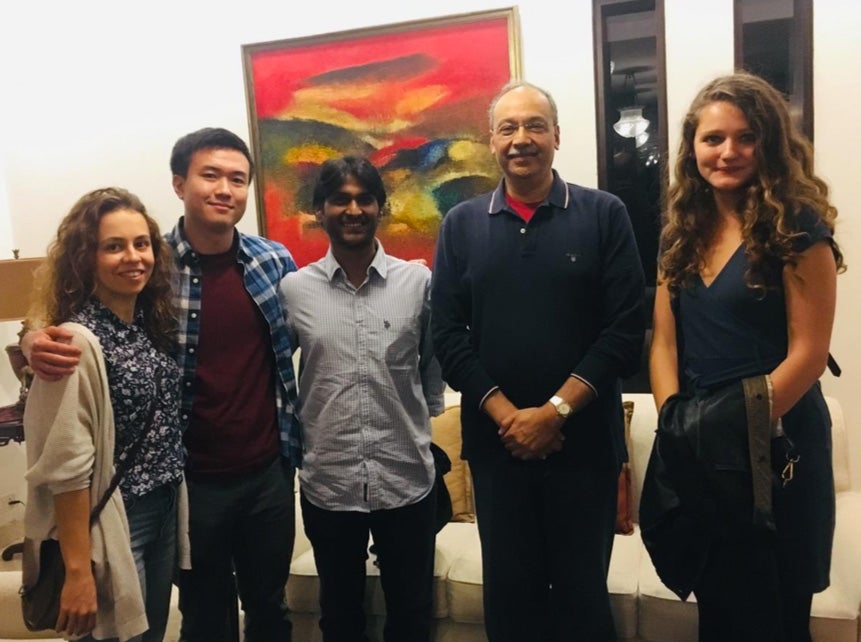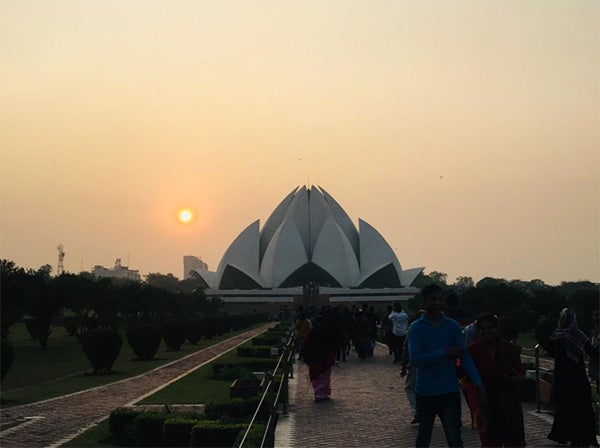A Place for Women in India’s Dynamic FinTech Space
A Place for Women in India’s Dynamic FinTech Space

Members of the team meet with CS Reddy, founder and CEO of APMAS, an Indian organization focused on empowering women self-help groups across India | The team observes a weekly meeting of a women’s lending group in a rural community near Agra.

The team met at the New Delhi home of Alumni Network president Arvind K. Singhal (’82), chairman and managing director of Technopak Advisors
For our Applied Management Research project, our team worked with IDEO.org, a leading nonprofit design agency. This innovative organization is dedicated to improving the lives of people in poor and vulnerable communities through human-centered design solutions. Given our team members’ strong commitment to social impact and their diverse international backgrounds (Ukraine, Kazakhstan, India, China and the United States), we were particularly excited to contribute to a project that focused on empowering low-income women in six different countries. The goal of this project, funded by the Bill & Melinda Gates Foundation, was to examine barriers around the use of digital financial services (DFS) and prototype approaches for greater inclusion. Coming in at the very beginning of this two-year initiative, our team was tasked with analyzing the existing mobile money landscapes in each country, making strategic partner recommendations and assessing the market viability of prototype solutions.
We began thorough secondary research into the financial environments and existing gender-specific initiatives in Tanzania, India, Nigeria, northern Kenya, Bangladesh and Pakistan. Delving deep into examples and case studies from disparate parts of the world allowed us to both tease out throughlines and identify stark differences that require a customized, country-specific approach. However, we were also cognizant that secondary research, no matter how diligent, is no substitute for on-the-ground experience. So with generous financial support from the Center for Global Management, our team decided to travel to India to conduct primary research and experience first hand the social, cultural and economic realities.
We had three objectives for our India trip. First, we sought to survey the country’s dynamic FinTech space and identify opportunities for partnership with existing startups. Second, we wanted to observe customer interaction with existing financial inclusion programs in order to understand their needs from a human-centered design perspective. Last, we planned to attend the Inclusion Finance India Summit, which would give us the perfect opportunity to learn from practitioners in the field and assess the roles of diverse stakeholders. All this was to be accomplished in only 10 days. Eager to dive in, we scheduled our trip for the beginning of December and set off on a whirlwind journey that would dramatically transform our approach.

The team experienced the tranquil environment of the Bahai Lotus Temple in New Delhi at sunset
We realized our these objectives, but we also did much more than that. Being in country and experiencing the customer journey firsthand allowed us to deeply empathize with the women whose lives we hoped to impact. By attending savings group meetings and hearing the women’s dreams and aspirations, we came to appreciate the outsized importance of non-market forces in the success or failure of any initiative we might hope to launch. This visceral awareness of the deciding role of social and cultural factors, particularly gender relations, was not something we could have fully absorbed from secondary reports alone.
The trip also highlighted the extent to which these women’s needs are not being adequately met by the existing market solutions. We saw how lack of infrastructure and low financial literacy, compounded by systemic inequalities, create stark barriers to access and generate unforeseen negative externalities. Afterwards, we understood that a viable solution must involve cross-sector partnerships focused on financial education and supporting income-generating activities to grow the asset base. Only when this awareness and capacity are in place can increased demand sustainably drive adoption of digital financial services. As our final step in the project, we are assessing the feasibility of prototype interventions aimed at growing women’s agency through income generation.
We sincerely hope that our work plays a role, however small, in furthering the empowerment of women both in India and worldwide. The dreams and aspirations these strong females shared with us, as well as their hard work and determination, will continue to inspire us and inform our thinking of the global community for years to come.
UCLA Anderson MBA students conduct Applied Management Research (AMR) projects in lieu of a thesis. The nation’s first business school field study program, AMR partners students with top organizations to solve a key strategic problem. The Center for Global Management supported UCLA Anderson Class of 2019 teams to conduct critical primary research and collaborate with established NGOs seeking sustainable strategies to improve local economies, health and education outcomes, empowering local communities and developing more sustainable supply chains in environmentally sensitive parts of the world.